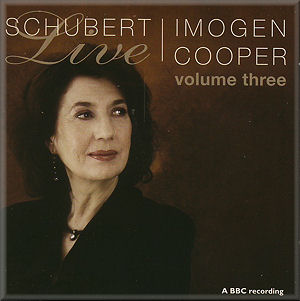 |
 |
|


alternatively
CD: AmazonUK
AmazonUS
Download: Classicsonline
|
Franz SCHUBERT (1797-1828)
Schubert Live - Volume Three
CD 1
Twelve German Dances for piano, D 790/Op. 171 1823 [11:02]
**
Sonata for piano in A minor, D 784/Op. 143 1823 [25:28] **
Hungarian melody for piano in B minor, D 817 1824 [3:32]
**
Sonata for piano in C major, D 840 "Reliquie" 1825
[23:24]*
CD 2
Four Impromptus for piano, D 899 in B flat major [29:29]
**
Sonata for piano in B flat major, D 960 1828 [40:04] **
Allegretto for piano in C minor, D 915 [4:38] **
Imogen Cooper (piano)
rec. 15 April, 2008*; 22 April, 2009**, Queen Elizabeth Hall, London,
UK. DDD
AVIE AV2158 [64:13 + 74:40] 
|
|
|
This is a recording of the third in an admirable series of recitals which Schubert specialist Imogen Cooper gave at the Queen Elizabeth Hall in 2008 and 2009. It must be said at the outset that these are wonderful interpretations … thoughtful, lyrical, perceptive, technically adept, persuasive - and very, very beautiful. Above all, they bring something new and lively to the way we know Schubert. And that's saying something.
Cooper's affinity with Schubert is well established: her six-volume survey of Schubert's 'last six years' on Ottavo won her much acclaim. She is aware of the competition… Brendel, Pollini, Lupu and Ashkenazy. But what she has to add apart from - perhaps because of - what those pianists have had to say should make every Schubert listener sit up and take notice.
Born in London, Cooper studied in Paris and Vienna. Her work as a soloist extends beyond recitals to appearances with New York Philharmonic, Vienna Philharmonic, Royal Concertgebouw, Dresden Staatskapelle and Philharmonia orchestras. She is also an accompanist in Lieder with the likes of Mark Padmore and Wolfgang Holzmair and plays in duo with the cellist, Sonia Wieder-Atherton.
In this recital (as in the first two) Cooper is completely in control from first note to last. And she balances that control by revealing the innermost spirit of the music. It's as consistently evident as the technique needed for such communication is concealed. Cooper seems to remember that, although Schubert was writing at the start of the Romantic period, he was also writing at the end of the Classical. In other words, the romanticism, the feeling may not have limits; but they have origins. Her delicate and sensitive playing of the final work on these two CDs, the C Minor Allegretto of D915 [CD.2 tr.9] is a case in point. It misses nothing. Yet suggests so much more.
There can be no doubt that Cooper responds most readily to the romantic, the affective - at times to the tender - in Schubert's writing. Yet rarely does her playing become over-passionate; never does she unduly accentuate the visionary for its own sake. It's always the music first and last. The end of the andante sostenuto of the B Flat major sonata (D960) [CD.2 tr.6], for example, has the ethereal and wistful which we expect. Almost as Brendel plays late Beethoven. But its structure is evident too. There's a barely suppressed rigour. Such rigour comes not chiefly from following what Schubert wrote bar by bar. But from a total and perhaps rather rare, awareness of the architecture of the entire four-movement, 40-minute, construction. The gentleness and languor only become as marked as makes sense in the context of the rest of the work.
By the same token, the cold water which splashes us throughout the following two faster movements Cooper only takes at a pace which won't break the spell. It's such 'thoughtful' water (or is, at least, thoughtfully thrown) that by the middle third of the allegro [CD.2 tr.8] we are firmly yet calmly reminded of the haunting qualities both of that recent andante; and of the even longer (16 minutes) opening molto moderato movement. Qualities, not atmosphere: Cooper's rigour again. Her playing is not impressionistic. But highly disciplined. Disciplined, though, to bring out all the pain and regret which this music tells us Schubert must have felt.
Cooper is on record as saying that she doesn't find the absence of an audience detrimental to her making the most of Schubert's music. To listen to her concentration, her responsiveness to every nuance of these wonderful pieces and to her subtle variations in tempo (the end of the D960 is a case in point … the final rush is held back just the right amount) is first to ask what it can be that thus gives her studio recordings such presence. And then to answer with one word of which Cooper must approve: Schubert. She becomes utterly rapt in the music. She allows it to speak to us with great directness. Yet not to run away with us. That blend of discipline and feeling again.
The acoustic is somewhat grand; it's that of the QEH, after all. But the engineers have successfully captured the intimacy and bravura of her playing, and of the occasion. Most pieces are applauded - we hear that briefly. The booklet has background, commentary and a biography of Cooper which is, characteristically, shorter than Misha Donat's essay on the music.
The real test with so many other recordings of this repertoire available on CD is whether you will want to return to listen to these often. The answer in this case is clear: Yes.
Mark Sealey
|
|












